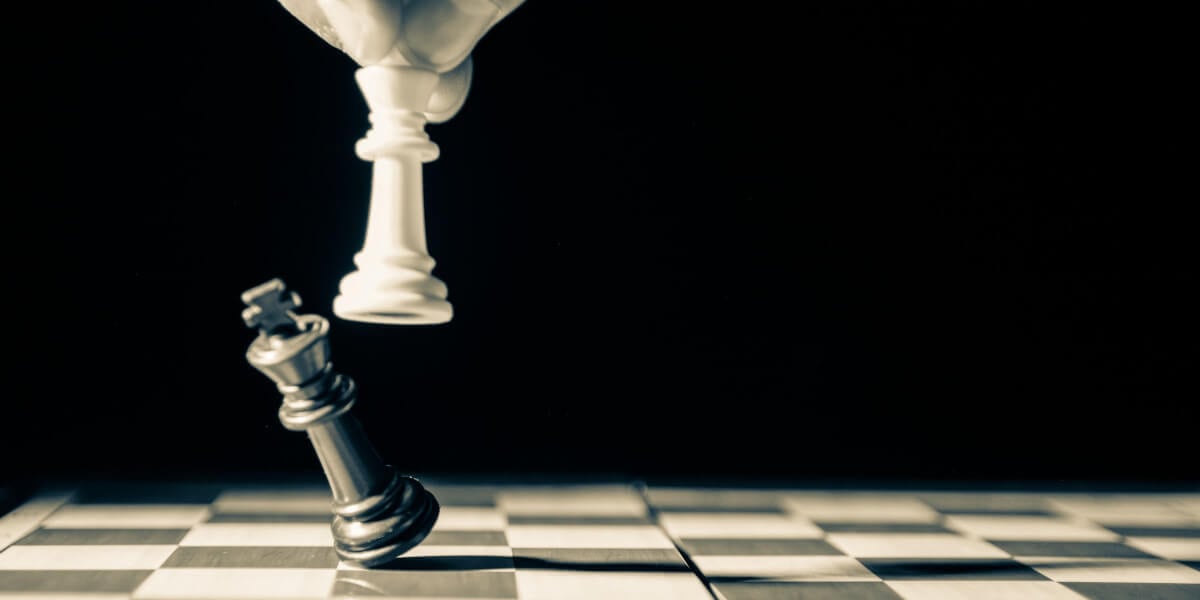
How to Win the Fight with OCD? Don’t Fight!
Would you rather listen? Click the arrow above. Ready to read? Scroll on!
When OCD Becomes a No-Win Game
There’s a great quote from the movie War Games highlighting the futility of nuclear war. Joshua the computer in the movie plays out war simulations to see what the best tactic is to win this type of war. With each scenario/simulation ending in total destruction of the world no matter the strategy, Joshua concludes, “A strange game. The only winning move is not to play.” Much like nuclear war, OCD (Obsessive Compulsive Disorder) benefits from this same type of thinking.
The Obsession–Compulsion Cycle Explained
When someone is struggling with OCD there’s usually a set pattern. First, a random or intrusive thought (called an obsession) causes a person to begin to excessively worry, becoming anxious and drawing irrational conclusions. For example, touching a toilet seat in a public bathroom may cause a thought that I’m going to get a rare deadly disease from this or if a person thinks of a blasphemous thought against God they may feel they are going to hell.
As a result, in order to get rid of the feeling of anxiety and/or guilt, a person uses what is called a compulsion. Usually this is a type of excessive behavior done in order to lessen the feeling of anxiety or other unpleasant feelings as a result of their obsession. For the person worried about getting the rare deadly disease they may wash their hands 10 to 20 times in order to make sure they won’t contract the disease.
Likewise, the person with the blasphemous thought may pray for hours at a time in order to feel right with God. Though the compulsions provide some relief from the obsession (of getting the disease or of going to hell) it is usually at the cost of becoming a significant impairment, usually wasting time and often getting stuck. Typically the compulsions are never enough to fully rid themselves of the unpleasant feelings/thoughts and the person must continue to use the compulsions in order to get relief from the obsessions.
Why Trying to Think Your Way Out of OCD Fails
Some theories subscribe to challenging the rationality of the thought the individual struggles with. For example, in cognitive therapy (CT) a therapist may challenge the evidence of the likelihood a person will contract the rare disease by using statistics to show how rare it is to contract that disease. They may say that the idea of contracting the disease is just a thought and does not mean anything.
Unfortunately, this method of rationalizing may make OCD worse rather than help it. For example, in the disease case, OCD likely would come back at these rationalizations to say, “So let’s say there is a one in a million chance I contract this disease. What if I’m that one?” CT in other therapy contexts is useful but in dealing with OCD this way it usually only adds kindling to the fire.
OCD Is Like a Wrestler That Wins When You Fight Back
In order to further understand how OCD overcomes our rationality, it may be helpful to look at a wrestling ring.
Let’s say OCD is kind of like an arrogant wrestler hounding his opponent from the ring. He calls him names, insults his family, and does whatever he can to get him in the ring to fight. Once the opponent is in the ring, however, he continually will fight the wrestler, and with the wrestler being stronger than the opponent will never let him back out. In order to fight OCD, one must embrace the idea of uncertainty. So what does this look like? Let’s go back to our example with the fear of getting a rare deadly disease. The individual touched a toilet seat in a public bathroom and therefore feared they may have the disease as a result.
Learning to Live With Uncertainty Instead of Compulsions
In order to embrace uncertainty they sacrifice washing their hands excessively and then say to themselves, “I may or may not have contracted this disease but I will not exceed washing my hands one time. I will leave the bathroom and go about my day.” Or in the case of the blasphemy example, “I may or may not go to hell for that thought but nevertheless I will continue running my errands and deal with this later.”
At this point, their anxiety will remain and OCD will hound them about being a horrible person and needing to pray excessively, wash their hands, or whatever compulsion they struggle with. However, if these individuals continue to embrace uncertainty and the anxiety that comes with it over time OCD will lose its power over them and they will become less anxious not needing the compulsions. They will be able to walk away from the wrestler and eventually learn how to manage their OCD.
OCD is difficult to fight alone, and seeing a counselor who knows how to deal with OCD is vitally important to manage it in a healthy way. This is not easy by any means, but what is better – to be stuck in an endless wrestling match using compulsions to find momentary relief, or to find true freedom in living with uncertainty?
If you're struggling with obsessions, repetitive thoughts, or other anxious behaviors, cognitive behavioral therapy and dialectical behavioral therapy can be great ways to learn how to identify emotions and triggers and learn how to manage life with OCD. Search our Lifeologie Counseling OCD specialists and reach out to connect with a therapist near you!

About Lifeologie
Lifeologie Counseling was founded in 2000 with one goal in mind — to bring a fresh, innovative approach to the everyday problems of life. Creative solutions to stuck problems®. With our unique multi-specialty, collaborative approach, Lifeologie Counseling helps individuals and families heal their wounds and break out of old, unhealthy patterns.




